Says political will and commitment are essential to the success of polio eradication efforts.
ISLAMABAD, 03 SEPTEMBER 2023 – Global Director for Polio Eradication at WHO, Aidan O’Leary, met Health Minister Dr. Nadeem Jan on Friday, concluding the visit of the Global Polio Eradication Initiative’s (GPEI) Strategy Committee.
This was the first engagement between senior GPEI officials and the caretaker government.
In a meeting held at the Health Ministry, Dr Jan said: “It is important for us that our country and global partners and donors stand together in this final leg of the eradication journey.”
The Strategy Committee of the GPEI, chaired by O’Leary, is an executive committee set up to oversee the management and execution of the Polio Endgame Plan, that aims to achieve eradication by 2026.
“There is no time to waste. The Health Ministry will support any measure to interrupt wild poliovirus transmission by the global deadline at the end of 2023,” the minister added.
“I am a polio worker at heart. I will ensure that not only does polio remain a priority at all tiers of governance, but efforts are more targeted and intensified,” he stated.
Speaking after the meeting, O’Leary said: “Political will and commitment to get the job done is absolutely critical to the success of the programme.”
“We have been particularly impressed by the Health Minister’s very immediate and hands-on engagement with the Polio Programme. We certainly look forward to continued advocacy and support,” he said, adding: “The programme has been very successful in ensuring that virus circulation is not established with excellent outbreak responses to virus detection. This must continue for us to be able to deliver on what is a critical goal not just for Pakistan but for the entire world.”
O’Leary is the head of the Strategy Committee and was accompanied by Dr. Richard Franka, the Pakistan Team Lead for Polio Eradication at the US Centres for Disease Control and Prevention.
“To meet the goal of eradicating polio, Pakistan’s polio programme must enhance efforts to identify and vaccinate children who have not received polio vaccines, especially in areas experiencing conflict and insecurity,” Dr. Franka said.
During their three-day visit to Pakistan, the delegation also met the Engineer-in-Chief at the General Headquarters in Islamabad, the District Commissioner of Peshawar and the Health Minister of Sindh, among other key officials.
Note for the Editor:
Polio is a highly infectious disease caused by poliovirus mainly affecting children under the age of five years. It invades the nervous system and can cause paralysis or even death. While there is no cure for polio, vaccination is the most effective way to protect children from this crippling disease. Each time a child under the age of five is vaccinated, their protection against the virus is increased. Repeated immunisations have protected millions of children from polio, allowing almost all countries in the world to become polio-free, besides the two endemic countries of Pakistan and Afghanistan.
For further information, please contact:
Mr. Zulfiqar Babakhel, Media Manager, NEOC, 0345-9165937; Email: This email address is being protected from spambots. You need JavaScript enabled to view it.

